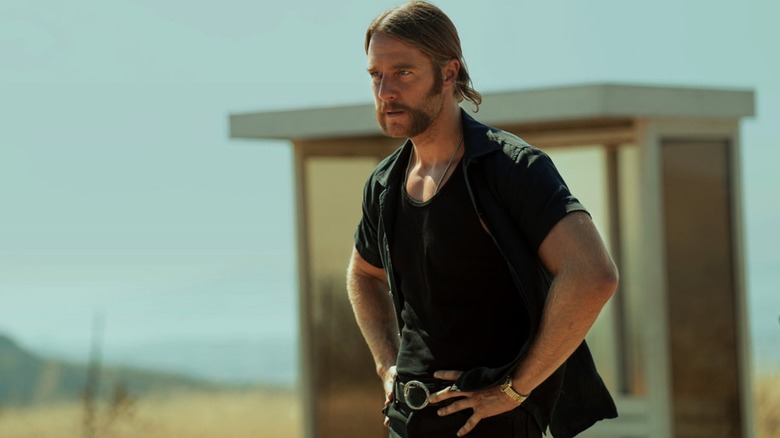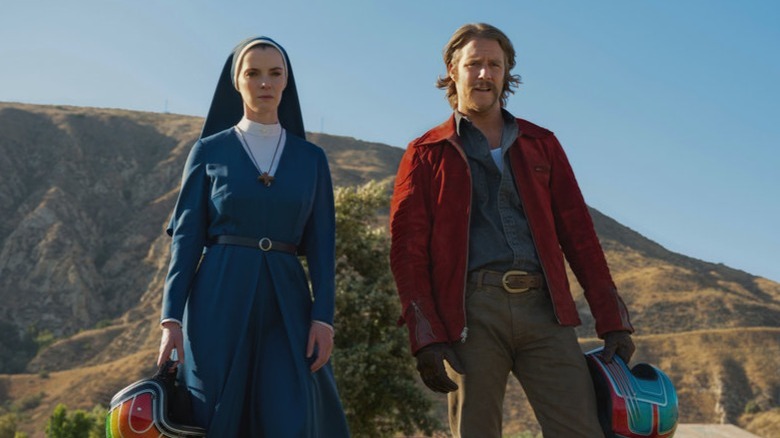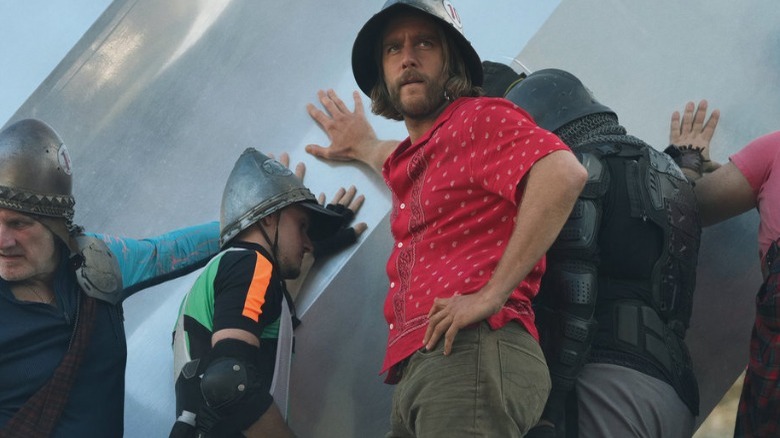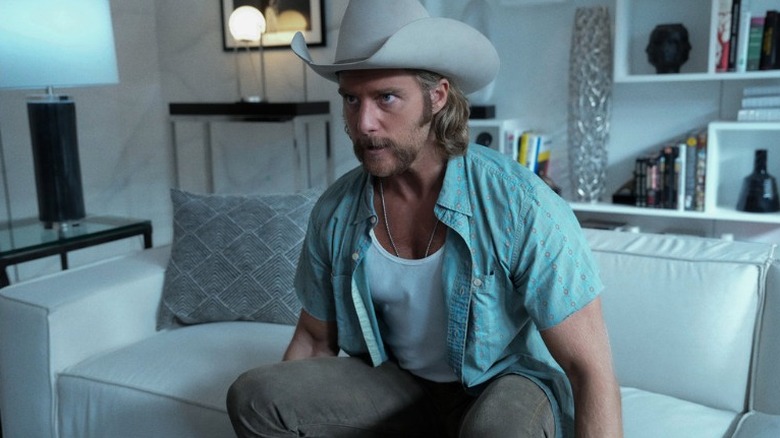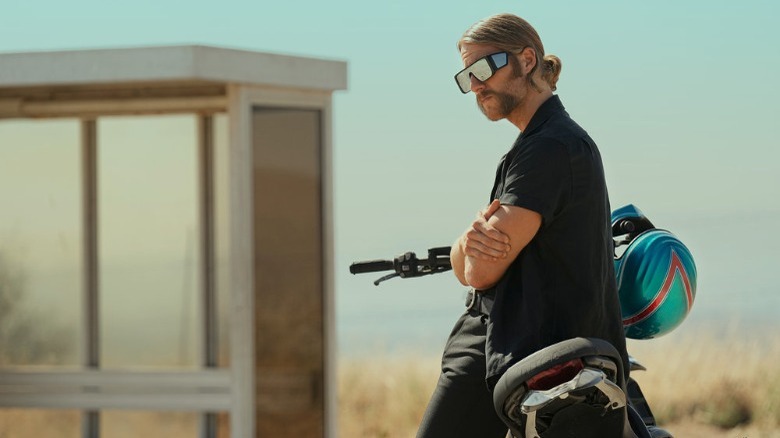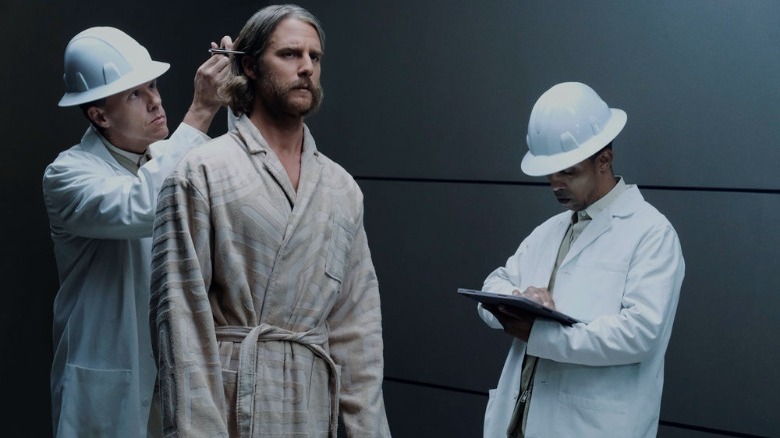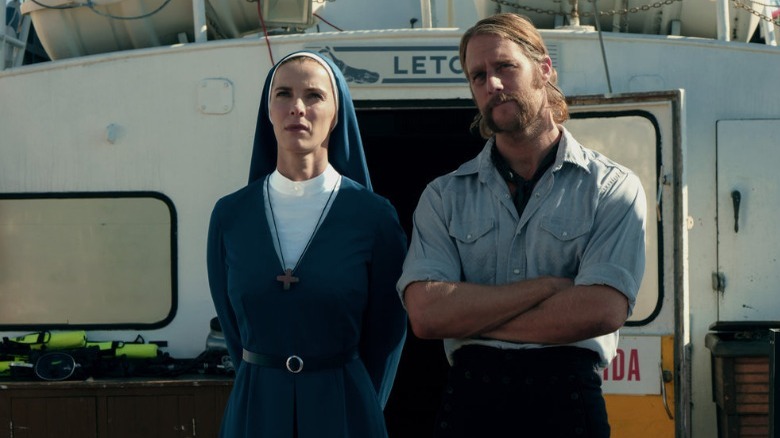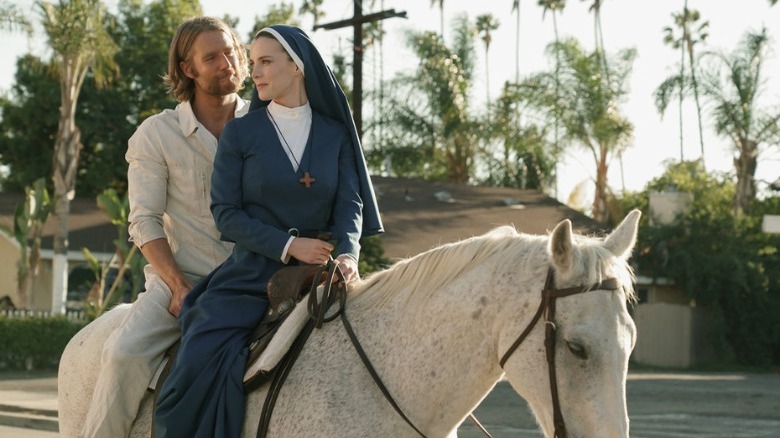Mrs. Davis Star Jake McDorman On That Finale Roller Coaster, The Future Of The Series, And More [Exclusive Interview]
This post contains spoilers for the finale of "Mrs. Davis."
"Mrs. Davis" is, far and away, the most difficult show to describe on TV right now. In the simplest of terms, it's about a nun and a rodeo cowboy on the hunt for the Holy Grail, which they plan to use to shut down a nearly omnipotent algorithm called Mrs. Davis. In more complex terms, it involves a stage magician who may or may not have dissolved himself in acid, a diner cook who is actually Jesus Christ incarnate, and, in the finale, a roller coaster designed to kill algorithm users who trade some of their lifespans for a virtual reward called "wings."
The Peacock series is funny and strange, and with "The Leftovers" creator Damon Lindelof and "The Big Bang Theory" writer Tara Hernandez at the helm, it also has a lot on its mind. If one character brings together the disparate tonal and thematic threads of this far-flung story better than any other, it's Wiley, the mustachioed resistance leader played by Jake McDorman ("What We Do in the Shadows," "The Right Stuff"). It's Wiley who finds himself at the mercy of a potentially life-ending roller coaster in the finale, in a moment that — like many in the wacky show — is surprisingly profound.
/Film spoke with McDorman about what it was like to film that finale. We also talked about exploding horses, the future of "Mrs. Davis," the Tom Hanks comedies that inspired his excellent comedic turn in the show, another sci-fi series he's appearing in this month, and a whole lot more.
Note: This interview has been lightly edited for clarity and brevity.
'You would think by now I'd have this condensed into a sound bite'
So first off, just to start, when I try to pitch this show to other people, I'm sure you've had this issue: It's a little bit of a wild one to explain. I feel like I tend to go with what's in the DNA of the show, describing like, "It's a little bit like Douglas Adams, it's a little bit like the weirder episodes of 'The Leftovers,'" you know?
McDorman: [laughs]
How do you typically go about describing the weird, wonderful world of "Mrs. Davis"?
McDorman: You know, you would think by now I'd have this condensed into a sound bite, and I really don't. It's so much easier to write. I actually had a good interview the other day, it was just a written interview, and it took so long, but I finally got a paragraph and I was like, "That's it."
Thinking about it off the top of my head wouldn't come naturally and it'd sound like an escaped mental patient, which, yeah, has been a struggle since we started production. I'm so excited about this show. I love everything about the show. So, naturally, I want to communicate it to my friends and family, but it never goes well. So, I'll be so happy that it's out and they can actually see it.
Exactly.
McDorman: Betty [Gilpin] has coined the term "No Country For Old Looney Tunes."
Oh, yeah. That's good.
McDorman: And I think that probably gets to the heart of it faster than anything I've tried to cobble together.
'I'm so on board with this'
When you were first looking at the scripts ... there are just so many moments, I feel like everyone I know who's watched it has a different moment that hooked them in the show. Was there something that hooked you to it?
McDorman: Well, the first, when it came to me as an audition, it was the scene from the first episode where Simone and Wiley are under the rock. And really, the only context was that, because it's a Damon script and if they let any of us leak you'll get like a Damon "Lost" dart inside your neck. They put you down.
So it was just that scene. Maybe another scene, [too]? But [they said], "This is your ex-girlfriend who's a nun and was being pursued by Germans, and a benevolent, ubiquitous AI that was taking over the world. Go." And I was like, "Yes!" And so, I was reading it, and already apparent in this banter between Simone and Wiley in the moment, I can pick up on, "Oh, I think this is funny." I mean, it's certainly bizarre. But not having any context around the scene, it was like, "Well, I don't want to play it too funny if it's dramatic or if I just missed the tone of the show," because it didn't feel so specific. But luckily, they sent me, I think, the first two things. And I just fell in love with it.
Because then you realize, like, the scene that I was reading isn't even until the end of that subplot. And that's after you have flashbacks to ancient times. You've got Betty riding in with on a horse ... So I was like, "Yeah, okay, so we're really going for it." So, luckily by the time I had the scripts for one and two, I could kind of pick up on what the tone was. But I think, for my callback, they sent me [episode] three. And that was the Excalibattle and Jezebull. And that scene, trying to imagine what that would look like — a giant sword coming out of the ground, yelling at a nun about how she's f***ing Jesus, was when I was like, "I'm so on board with this."
'I had to assure her the horse was actually okay'
That's actually one that I wanted to ask about, because I think that also for me was when I realized that the show is so funny. I loved your comedy work in the show, especially. Like you said, it has the drama and the comedy, surrealism, all that going on. But did you have any comedic touchstones or performances that you looked to when you were doing this role?
McDorman: Yeah. I mean, so much of it felt like a throwback almost to like those early Tom Hanks comedies like "The Money Pit," "Big," "Turner & Hooch."
Yeah.
McDorman: I guess if there was one I could think of it would be that stuff, because there was opportunity here to do physical comedy, but then Betty has such a dry wit to her, to bounce off that too. So, the whole show, as you're saying, goes sci-fi, drama, but if you isolate the comedy, I feel like it has just as many variations inside that one genre as it does all the overarching genres. So there's slapstick, there's the rom-com kind of thing for the exes. It was a challenge in the best way. Every single day you can kind of figure out what the line was. Honestly, Betty set the tone for me so well. She's just a magical human being.
But how far can we push it? You can really push it as far as you f***ing can, without being able to pull it back so that we still care about them, sincerely. Because too silly all the time — and we certainly get close — you're not going to be able to still have the emotional purchase to actually be saddened by a rollercoaster [that can kill you].
Yeah, and your character still does manage to have that hero's journey going on. I think it takes a lot to come back from you being introduced blowing up the horse.
McDorman: Yeah, my mom's biggest complaint. I had the breakdown of episode eight really early in the season, and I had to, like ... if she was going to go any further on this journey with me, I had to assure her the horse was actually okay.
'His toxic masculinity bomb exploded'
Wiley, I think, is really well-written, and that speaks to coming back after blowing up the horse. We still like him. I was wondering what conversations with Damon and Tara looked like in terms of his hero's journey and crafting that?
McDorman: Well, it was really, he has this complex that ... I mean, it could be the source of so much toxic masculinity and his toxic masculinity bomb exploded, which is the Resistance. Which, I don't think we called it this in the show, but in the scripts, their headquarters was called Durden HQ. Like Tyler Durden.
Like "Fight Club," yeah.
McDorman: There were all these little sprinkles of things these guys thought were cool. But at the core of all that, he's so concerned with how he's being perceived, this deep insecurity that he's not man enough, that he's a coward, that it's these inadequacies that chased Simone away. Which, it was none of those things, you know? But they're so now deeply ingrained into his motivations and his personality, that they're almost on autopilot.
One of the parts of his arc, kind of towards the end of episode seven and all of episode eight, is when I think he realizes that the whole Resistance, as much as he can justify taking down this evil algorithm, it's still a way for him to dodge responsibility, for him to avoid the path that he made — a rash decision that has a consequence ... [Wiley chose the] coward's way by saying, "I'll just get automatic wings with an expiration date. I don't have to earn it through good deeds, I'll take the shortcut." And it's not until he decides to turn himself in that I think he's kind of decided to stop running from that. That's the first time I really felt like Wiley was shifting into, "Okay, I'm [ready for this]," and kind of had this ego death of turning himself in and probably dying.
Wiley is 'like Stuart Smalley looking at himself in a mirror'
I actually ended up thinking that plotline ended up being kind of the most surprisingly poignant part of the show. I was wondering what it was like to film those scenes with him facing his expiration date, in the center?
McDorman: Yeah. It was really emotional. It was important, at the end of [episode] seven, I was so proud of him in a way, because it was a twist when I was reading it, the "how much is he going to Mrs. Davis versus how much is he falling for her" thing. When he gives a big speech and tells JQ, "Is she f***ing watching us? Meet me in the desert." Does he really think this is what they have to do? Then the reveal was like, no, he just went ahead and set them free.
Because as much as they all say, the non-users, they're anti-this algorithm, they're still totally enmeshed in the ubiquity of this in their lives, as a user would be. When he made the decision to blow it up anyway, and he turned himself in anyway, it was a big shift for him. So yeah, the conversations I would have with Damon and Tara about this, especially going into episode eight, is that he still carries in that bravado. Like, "You're not going to kill me." This is all [fake], you know ... and I was really like, "How much of that is bravado and how much of that does he actually think is at stake?"
So, we really wanted to make sure, this is his, like, what happens when you expire? Is he going to try to wiggle out of it and downplay his actual fear? But no, he really does think that he's coming in to die. So in that context, it was incredibly emotional. Out of context, it's still ludicrous. The fact that I can really genuinely — and I mean genuinely — deeply feel compassionate sadness and fear for this guy when he's getting into like a shoe –
[Laughs]
– that's a rollercoaster that's going to, you know, put you down. It all felt really real and really scary, and it's only kind of insulated as you go through the show and follow the arc, emotionally, despite all the Looney Tunes that's going on. And yeah, it was incredibly just rewarding for the character, and also very emotional for me. I mean, I've never had a job that lets you play on such opposite sides of the spectrum within a given scene. Like it's not even episode to episode, a scene can go [to both ends of the spectrum].
Yeah.
McDorman: It was great. Especially just, there's something really therapeutic, and I think related to ... I mean, almost going back to like ["Saturday Night Live" character] Stuart Smalley looking at himself in a mirror and being like, "I'm good enough, I'm smart enough, and doggone it, people like me." I mean, it was such a heavy thing to say out loud and to know how hard it was for him to say out loud, "I am worthy." You know? "I don't have to run, I don't have to try so hard."
'There was a reverence'
Andy McQueen's so good in this show too, but then J and Wiley aren't in the same place for so long, and they're so different, right? Did the scene that you finally got to shoot with him feel kind of like an extension of that emotion?
McDorman: Oh, man. I mean, Andy had been there. I think Andy had like eight production days for our whole entire shoot ... and for the longest time, we would just hang out on the set in between scenes without any idea [that we would get] to act in the scene together. So, I was really excited to go for it, I think all three of us were, that they found a way to put Wiley and J in a scene together.
It's not what you'd expect. Wiley has certainly spent a lot of the show, after he finds out that Simone is literally married to Jesus, thinking Simone's sort of crazy. So to kind of step into their show that they've been having without me, there was a reverence — which makes sense because of a Jesus Christ [figure].
And also just kind of like, it can be his little, "Okay, cool, I was wrong, you're not crazy." And especially the interaction between Wiley and Simone in that scene. We kind of looked at that as, these are two people that, their whole relationship was bad. It was a mess. It was co-dependent. Just, it needed an evolution, it was going to evolve in the direction of them having a romantic relationship or friendship or nothing. Or both of them being dead: Her head could possibly explode and the rollercoaster could kill him.
So the fact that they got to this moment, and surprise for both, that gave them an opportunity. I liked that neither of them said what the other, what they were doing with him. Kind of like, "Well, if you're going, if you're here, you must be going through something intense." "What about you?" "Yes." That's all we can just say.
Yeah.
McDorman: "Let's just say our goodbyes, because this is probably it."
'I would play this thing for as long as they'd let me'
It worked really well. I do have to ask, how did that rollercoaster set work? Was there actually a little ride you got to go on?
McDorman: A little bit. Honestly, I haven't even seen the episode, so, I don't even know what the final product looks like. I know that they were in visual effects, post-production, a long time, obviously. I think they were spending the most time on that rollercoaster and the whale.
So maybe it's this big thing, I haven't seen it. On the day, it was a lot of blue screen. They had the walkway ... and then the shoe. I know it was really high up off the ground, I had to get in a really tall window. And it was like on a hydraulic, so it tipped like that, it had a little stretch of roller coaster going forward and back. But it wasn't like we shut down Universal Studios and got on the Harry Potter ride.
That makes sense. The finale felt pretty final to me. If you were given another chapter of the story, would you want to continue, or does it feel final to you as well?
McDorman: It's so funny, I – of course, but at the same time, I would trust Tara and Damon if they say, "It's not happening." I really like everything tied up in a neat bow, even though there's still some little things in our show that could be explored. If they felt they had more to say for these characters, I would trust their expertise completely. I would play this thing for as long as they'd let me, and I would work with Betty as long as they'd let me. I know we're all game to do this forever.
We were talking about how hard it's going to be to go to the next thing that's just, like, a drama. My attention span is now, it can oscillate between a whole handful of [genres]. But, yeah, I know that we, as a cast, and a lot of the creatives as well, love this world, love the characters, love working with each other, so of course we'd be down. But as far as, is it worth it to open it back up? That I trust Tara and Damon.
Yeah, definitely. Speaking of other projects, I got to watch a bit of "Class of '09" as well, and I noticed that also has a big, powerful computer situation going on.
McDorman: I thought you were going to say, it also has a big mustache.
Oh, yeah. That too.
McDorman: I know. I had to have a mustache for like a year and a half.
That's so funny. Was that a coincidence, or were you interested in these projects because of the tech angle?
McDorman: Totally coincidence. "Class of '09," funny enough, I made my audition for "Mrs. Davis" while I was shooting "Class of '09." So, they actually came out in opposite order.
We wrapped on "Class of '09" and moved on to "Mrs. Davis." We finished "Mrs. Davis," it came out first and this came out second. So, no, it's been a bit different they're obviously very different shows. But yeah, dealing with AI. I mean, you can say this about both of those shows, they had the foresight to kind of predict ... not like AI isn't something that we've obviously been talking about as long as it's ever been anything. But the way that it would be all about ChatGPT and Midjourney and everything we're talking about now, it's just really scary timing.
Yeah, definitely. So what you're saying is they saw the mustache on the audition tape and they made you keep it on "Mrs. Davis"?
McDorman: Might be the worst mistake I ever made, shaving the mustache. Maybe I can Tom Selleck it.
All episodes of "Mrs. Davis" are streaming now on Peacock.
